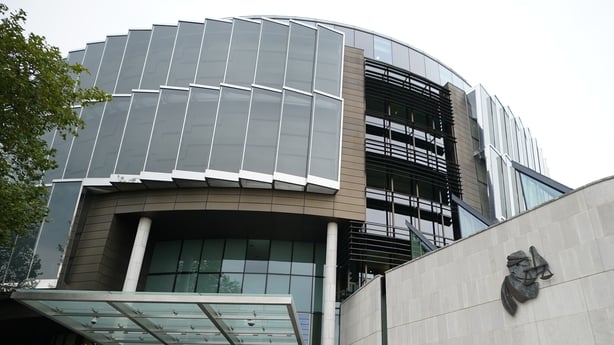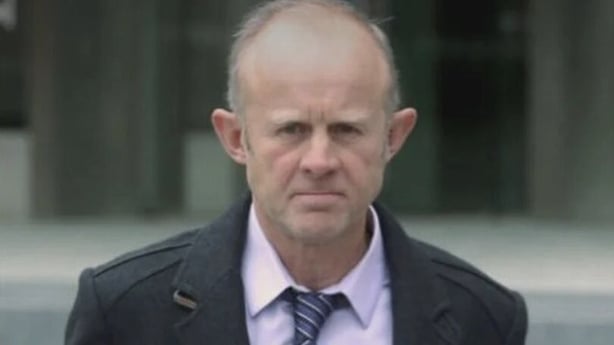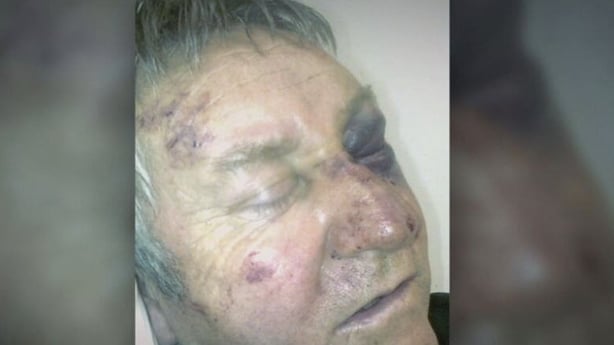Fifteen months after an RTÉ Investigates exposed accountant and former international hockey player Catriona Carey as a fraudster, some victims are questioning the pace of the garda investigation.
Ms Carey has been interviewed by Gardaí but she has not been charged with any related offences.
"She is still walking around, that is a slap in the face," Dubliner Phil Conway told Prime Time.
"It was a blatant act of crime" that is going "unpunished," said Mr Conway's partner, Miriam Tormey.
Ms Tormey borrowed €20,000 from the credit union to pay Ms Carey for a service that was never received.
"She is laughing in everybody’s face, the guards, the solicitors, everyone and mostly us."
Referring to the garda investigation, Mr Conway said, "I don’t think it is effective, the pace that it is going."
"If they [gardaí] only had an allegation and they had to go and investigate everything I can totally understand that, but we gifted them everything."
"Bank account, transaction reference numbers, they were given it. She took our money, and she spent it."
The RTÉ programme revealed that Ms Carey defrauded at least 18 people of hundreds of thousands of euro, typically targeting people in trouble with their mortgages.
Her company, Careysfort Asset Estates Limited, offered to buy their debt from their lenders and issue them with a new mortgage so they could stay in their homes.
People paid refundable deposits, usually around €15000 to €35000 euro for a service which turned out to be a scam.
An Garda Síochána wouldn’t comment on its investigation into Catriona Carey but said in a statement that, in general, "economic crime investigations are complex and technical."
"An Garda Síochána does not set nor is subject to timelines in respect of any investigation."
In an email, Ms Carey told Prime Time, "I do not have any control over the judicial system, but I have fully contributed to the investigation to date which is still ongoing."
As trial delays have significantly lengthened due to the Covid-19 pandemic, even if Catriona Carey was charged tomorrow it would be a long time before her trial begins.
Figures from the Courts Service supplied to Prime Time show that as of March this year the waiting time for a trial in Dublin’s Circuit Criminal Court, once a person is charged and the book of evidence is provided, is 26 weeks for those already in custody.
For people out on bail - as those charged with white collar crimes typically are - it is 104 to 130 weeks. In other words, more than two years.

Anecdotal evidence suggests that offenders on bail are taking advantage of a clogged justice system by delaying a guilty plea to buy a further two years or more of freedom.
"There will be a certain cohort of people who actually ultimately do intend on pleading guilty and want to deal with the matter by way of a guilty plea," barrister Lorcan Staines SC told Prime Time.
"Eventually, when they're told what the options are, you can have a sentencing date next week or next month, or you could plead not guilty for the moment and get an adjournment and not have to deal with it for two years, that becomes very attractive."
In a statement, the Director of Public Prosecutions told Prime Time that "additional judicial appointments to the Central Criminal Court," which mainly deals with murder and rape cases, "is leading to a reduction in the waiting times for trial."
"There continues to be cases listed for trial where there is no real prospect of the case being heard on that occasion," it said. That means more adjournments of cases, possibly after victims, witnesses, gardaí and lawyers have all turned up for court.
Referring to the Circuit Criminal Court which handles most serious or indictable crimes, the DPP said, "In most Circuits, the number of cases listed for trial exceeds the resources available."
That also means more adjournments.
Courts Service figures supplied to Prime Time show that in the first quarter of this year, in 23 of the 26 Circuit court areas around Ireland, a trial date will be on average over nine months from when a person is charged and a book of evidence provided.
In seven areas, the wait is at least two years.
Those figures did not include a geographical breakdown but statistics from the most recent Courts Service annual report suggest significant variation.
In 2021, the average wait for a Circuit Criminal trial for Mullingar was 3 years. In Monaghan, it was up to four years.
Getting a trial date is not the same thing as a trial starting, as adjournments and delays are commonplace.
"There are long-standing and really serious delays in our justice system," said Doireann Ansbro, Head of Legal and Policy for the Irish Council of Civil Liberties.
"In fact, the issue is so important and long-standing that we've we are actually in violation of our International legal obligations."
"The European Court of Human Rights has repeatedly said that the delays in the Irish justice system, constitute a breach of the right to a fair trial within a reasonable time," she said.
In 2012, musician and community activist Martin McAllister was badly beaten close to his home in Monaghan by a man from nearby Crossmaglen in South Armagh.
Eugene Hanratty, who broke Martin McAllister’s eye sockets in the attack, is a businessman with a history of violence and involvement in fuel smuggling. In 2007, he made a €2m settlement with the Criminal Assets Bureau.

The attack happened as Martin McAllister and his wife Mary were driving close to their home. A jeep carrying Eugene Hanratty blocked their way. Mr Hanratty jumped out of the vehicle and pulled Mr McAllister from the car.
"When I was initially struck, I passed out. I was hit a severe blow on the head by something," said Mr McAllister. The attack left him with continued damage to his peripheral vision.
Martin McAllister believes that the attack was connected to his outspoken stance on crime in the border area.
His road to justice was very long and winding. The case ended up with three trials.
The jury failed to agree on a verdict in the first and a subsequent trial was called off due to a technicality.
A third and final trial of Mr Hanratty for the assault on Martin McAllister was listed for February 2018, then adjourned to March 2018. It was adjourned again to October 2019, then to December 2019, then March 2021, then May 2021.
Finally in October 2022, the trial was held.
"It was continuously hanging over me," he said. "You had to organise your life around [it]."
Eugene Hanratty was finally convicted last November for assault causing harm. He was sentenced to four years, with one suspended.
The crime occurred in 2012, the sentence was handed down in 2022.

"Almost to the day, 10 years," said Mr McAllister.
"Very protracted… but it was not the fault of the Guards, definitely not. It was not the fault of the judiciary, or the DPP. The fault for that lies with the Department of Justice. There is a scarcity of judges," he said.
"On one occasion, it was going to trial, and we were all sent home. Why? Because there was no judge to hear it."
In February, Minister for Justice, Simon Harris announced that 44 extra judges would be hired over the next two years. That is an increase of roughly a quarter on the current numbers.
A special report, 'Justice Delayed', broadcasts on Prime Time on Thursday May 25.






